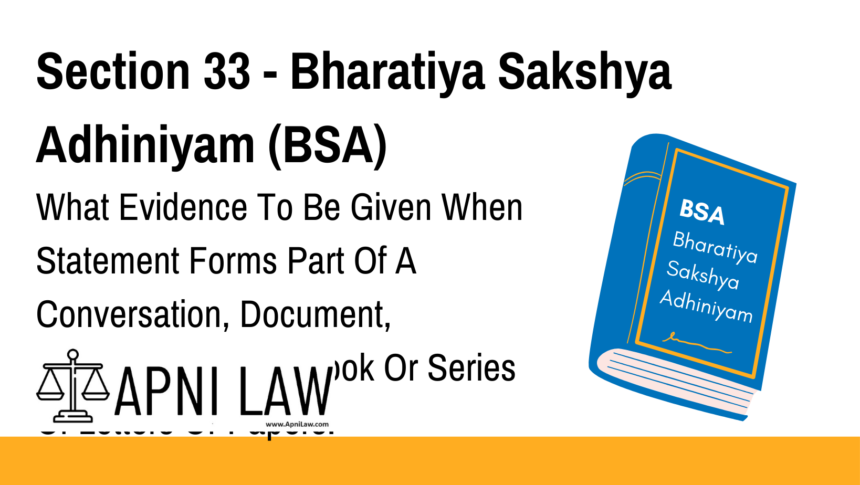Code
When any statement of which evidence is given forms part of a longer statement,
or of a conversation or part of an isolated document, or is contained in a document which
forms part of a book, or is contained in part of electronic record or of a connected series of
letters or papers, evidence shall be given of so much and no more of the statement,
conversation, document, electronic record, book or series of letters or papers as the Court
considers necessary in that particular case to the full understanding of the nature and effect
of the statement, and of the circumstances under which it was made.
Explanation
Section 33 of the Bharatiya Sakshya Adhiniyam (BSA) deals with selective admissibility of evidence from documents, statements, or conversations. It recognizes that:
-
Sometimes, a piece of evidence like a sentence, message, or paragraph is part of a much longer record.
-
The court need not look at the entire material.
-
Only the relevant part necessary to fully understand the context and meaning of the statement needs to be admitted.
This balances the need for evidence with efficiency and confidentiality
Illustration
Example 1:
An accused’s WhatsApp message is being presented as evidence. If it’s part of a long chat, the court may only admit those messages necessary to understand the context and implication of that specific message.
Example 2:
In a contract dispute, one clause is quoted as evidence. The court may require other clauses from the same agreement to fully understand its meaning, but not the entire document unless necessary.
Common Questions and Answers
1. Why limit the amount of material admitted?
To avoid overloading the court with irrelevant or distracting information and to protect unrelated confidential content.
2. Can the court demand the entire document?
Yes, if the judge believes full context is necessary to understand the part presented as evidence
3. Does this apply to emails or digital communication?
Absolutely. It applies to electronic records like email threads, social media DMs, chat logs, etc. Only relevant parts are necessary, but the court can ask for more context.
4. What happens if the other party insists on the full statement?
The court has the discretion to allow it only if it’s necessary for fair adjudication.
Conclusion
Section 33 BSA ensures that only the essential parts of longer statements, documents, or digital records are brought before the court, keeping proceedings focused and efficient while preserving fairness and necessary context.













